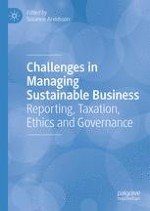2019 | OriginalPaper | Chapter
Sustainable Business Practices—An Environmental Economics Perspective
Authors : Tommy Lundgren, Lammertjan Dam, Bert Scholtens
Published in: Challenges in Managing Sustainable Business
Publisher: Springer International Publishing
Activate our intelligent search to find suitable subject content or patents.
Select sections of text to find matching patents with Artificial Intelligence. powered by
Select sections of text to find additional relevant content using AI-assisted search. powered by
